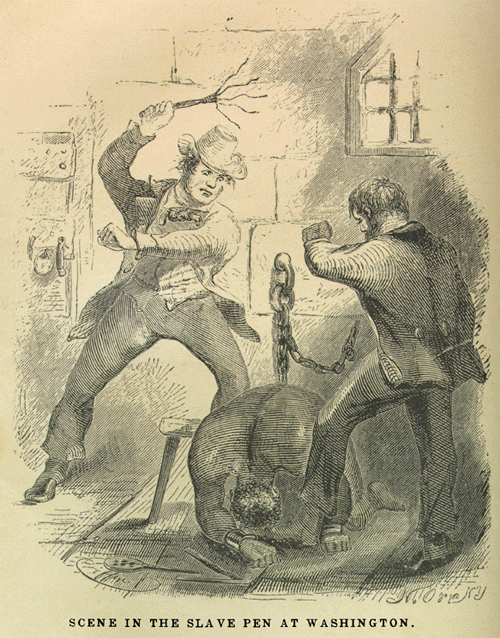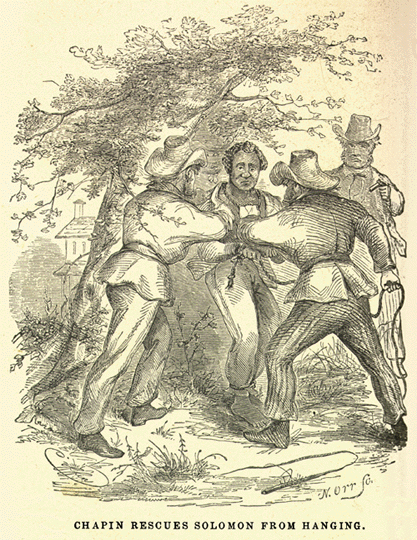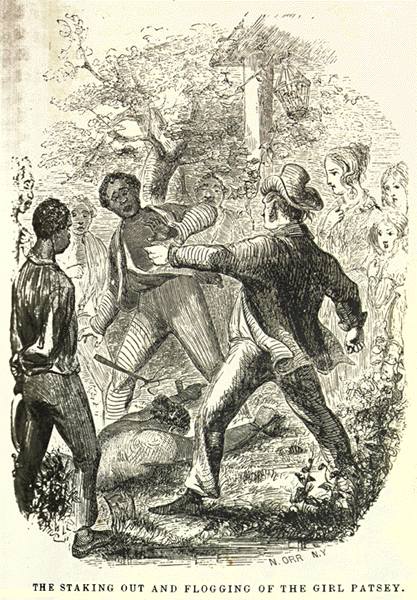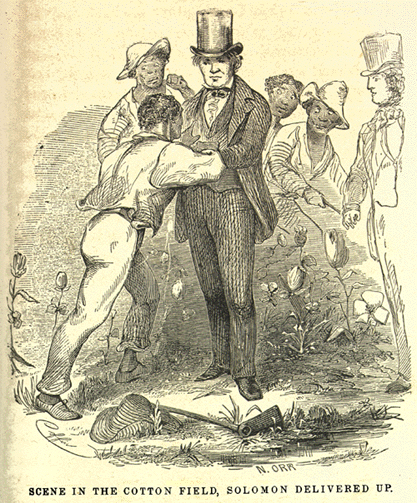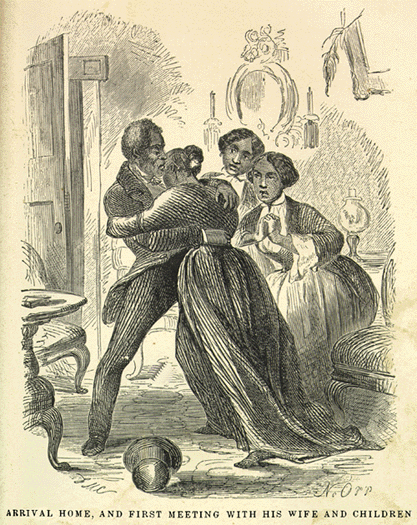The memoir, Twelve Years a Slave, chronicles the life of Solomon Northup, who was born free in New York, but captured and forced into slavery for 12 years in Louisiana. It was written in 1853 and his story was adapted into a major motion picture in 2013 under the same title.
Read excerpts from Northup's narrative, which describes his harrowing story and the atrocious conditions of sugar and cotton plantations in Louisiana for slaves at the time:
“There must have been some misapprehension—some unfortunate mistake. It could not be that a free citizen of New York, who had wronged no man, nor violated any law, should be dealt with thus inhumanly. The more I contemplated my situation, however, the more I became confirmed in my suspicions. It was a desolate thought, indeed. I felt there was no trust or mercy in unfeeling man; and commending myself to the God of the oppressed, bowed my head upon my fettered hands, and wept most bitterly.”
“With the paddle, Burch commenced beating me. Blow after blow was inflicted upon my naked body. When his unrelenting arm grew tired, he stopped and asked if I still insisted I was a free man I did insist upon it, and then the blows were renewed, faster and more energetically, if possible, than before. When again tired, he would repeat the same question, and receiving the same answer, continue his cruel labor. All this time, the incarnate devil was uttering most fiendish oaths. At length the paddle broke, leaving the useless handle in his hand. Still I would not yield. All his brutal blows could not force from my lips the foul lie that I was a slave. Casting madly on the floor the handle of the broken paddle, he seized the rope. This was far more painful than the other. I struggled with all my power, but it was in vain. I prayed for mercy, but my prayer was only answered with imprecations and with stripes. I thought I must die beneath the lashes of the accursed brute. Even now the flesh crawls upon my bones, as I recall the scene. I was all on fire. My sufferings I can compare to nothing else than the burning agonies of hell!”
“Tears flowed down my cheeks, but they only afforded a subject of insulting comment for my executioners. At length, as they were dragging me towards the tree, Chapin, who had momentarily disappeared from the piazza, came out of the house and walked towards us. He had a pistol in each hand, and as near as I can now recall to mind, spoke in a firm, determined manner, as follows: 'Gentlemen, I have a few words to say. You had better listen to them. Whoever moves that slave another foot from where he stands is a dead man. In the first place, he does not deserve this treatment. It is a shame to murder him in this manner. I never knew a more faithful boy than Platt. You, Tibeats, are in the fault yourself. You are pretty much of a scoundrel, and I know it, and you richly deserve the flogging you have received. In the next place, I have been overseer on this plantation seven years, and, in the absence of William Ford, am master here. My duty is to protect his interests, and that duty I shall perform. You are not responsible—you are a worthless fellow. Ford holds a mortgage on Platt of four hundred dollars. If you hang him he loses his debt. Until that is canceled you have no right to take his life. You have no right to take it anyway. There is a law for the slave as well as for the white man. You are no better than a murderer.' 'As for you,' addressing Cook and Ramsay, a couple of overseers from neighboring plantations, 'as for you—begone! If you have any regard for your own safety, I say, begone.'”
“Patsey, of whom I shall have more to say, was known as the most remarkable cotton picker on Bayou Boeuf. She picked with both hands and with such surprising rapidity, that five hundred pounds a day was not unusual for her. Each one is tasked, therefore, according to his picking abilities, none, however, to come short of two hundred weight. I, being unskillful always in that business, would have satisfied my master by bringing in the latter quantity, while on the other hand, Patsey would surely have been beaten it she failed to produce twice as much. The cotton grows from five to seven feet high, each stalk having a great many branches, shooting out in all directions, and lapping each other above the water furrow. There are few sights more pleasant to the eye, than a wide cotton field when it is in the bloom. It presents an appearance of purity, like an immaculate expanse of light, new-fallen snow. Sometimes the slave picks down one side of a row, and back upon the other, but more usually, there is one on either side, gathering all that has blossomed, leaving the unopened bolls for a succeeding picking. When the sack is tilled, it is emptied into the basket and trodden down. It is necessary to be extremely careful the first time going through the field, in order not to break the branches off the stalks. The cotton will not bloom upon a broken branch. Epps never failed to inflict the severest chastisement on the unlucky servant who, either carelessly or unavoidably, was guilty in the least degree in this respect. The hands are required to be in the cotton field as soon as it is light in the morning, and, with the exception of ten or fifteen minutes, which is given them at noon to swallow their allowance of cold bacon, they are not permitted to be a moment idle until it is too dark to see, and when the moon is full, they often times labor till the middle of the night. They do not dare to stop even at dinnertime, nor return to the quarters, however late it be, until the order to halt is given by the driver. The day’s work over in the field, the baskets are 'toted,' or in other words, carried to the gin-house, where the cotton is weighed. No matter how fatigued and weary he may be—no matter how much he longs for sleep and rest—a slave never approaches the gin-house with his basket of cotton but with fear. If it falls short in weight—if he has not performed the full task appointed him, he knows that he must suffer. And if he has exceeded it by ten or twenty pounds, in all probability his master will measure the next day’s task accordingly. So, whether he has too little or too much, his approach to the gin-house is always with fear and trembling. Most frequently they have too little, and therefore it is they are not anxious to leave the field. After weighing, follow the whippings; and then the baskets are carried to the cotton house, and their contents stored away like hay, all hands being sent in to tramp it down.”
“He is known as a 'nigger breaker,' distinguished for his faculty of subduing the spirit of the slave, and priding himself upon his reputation in this respect, as a jockey boasts of his skill in managing a refractory horse. He looked upon a colored man, not as a human being, responsible to his Creator for the small talent entrusted to him, but as a 'chattel personal,' as mere live property, no better, except in value, than his mule or dog. When the evidence, clear and indisputable, was laid before him that I was a free man, and as much entitled to my liberty as he—when, on the day I left, he was informed that I had a wife and children, as dear to me as his babes to him, he only raved and swore, denouncing the law that tore me from him, and declaring he would find out the man who had forwarded the letter that disclosed the place of my captivity, if there was any virtue or power in money, and would take his life. He thought of nothing but his loss, and cursed me for having been born free. He could have stood unmoved and seen the tongues of his poor slaves torn out by the roots—he could have seen them burned to ashes over a slow fire, or gnawed to death by dogs, if it only brought him profit. Such a hard, cruel, unjust man is Edwin Epps.”
“The existence of slavery in its most cruel form among them has a tendency to brutalize the humane and finer feelings of their nature. Daily witnesses of human suffering—listening to the agonizing screeches of the slave—beholding him writhing beneath the merciless lash—bitten and torn by dogs—dying without attention, and buried without shroud or coffin it cannot otherwise be expected, than that they should become brutified and reckless of human life. It is true there are many kind-hearted and good men in the parish of Avoyelles—such men as William Ford—who can look with pity upon the sufferings of a slave, just as there are, over all the world, sensitive and sympathetic spirits, who cannot look with indifference upon the sufferings of any creature which the Almighty has endowed with life. It is not the fault of the slaveholder that he is cruel, so much as it is the fault of the system under which he lives. He cannot withstand the influence of habit and associations that surround him. Taught from earliest childhood, by all that he sees and hears, that the rod is for the slave’s back, he will not be apt to change his opinions in maturer years. There may be humane masters, as there certainly are inhuman ones—there may be slaves well-clothed, well-fed, and happy, as there surely are those half-clad, half-starved and miserable; nevertheless, the institution that tolerates such wrong and inhumanity as I have witnessed, is a cruel, unjust, and barbarous one. Men may write fictions portraying lowly life as it is, or as it is not—may expatiate with owlish gravity upon the bliss of ignorance— discourse flippantly from armchairs of the pleasures of slave life; but let them toil with him in the field—sleep with him in the cabin—feed with him on husks; let them behold him scourged, hunted, trampled on, and they will come back with another story in their mouths. Let them know the heart of the poor slave—learn his secret thoughts—thoughts he dare not utter in the hearing of the white man; let them sit by him in the silent watches of the night—converse with him in trustful confidence, of 'life, liberty, and the pursuit of happiness,' and they will find that ninety-nine out of every hundred are intelligent enough to understand their situation, and to cherish in their bosoms the love of freedom, as passionately as themselves.”
Photos Source: Documenting the American South
Comment |

 Share on Facebook
Share on Facebook
 Tweet
Tweet
 Add My Story
Add My Story